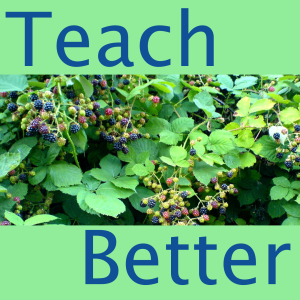
Podcast #42: Evidence-based Teaching with Bill Goffe
 2016-11-07
2016-11-07
Bill Goffe teaches economics at Penn State where he is both a consumer and a producer of evidence-based teaching. He is also an Associate Editor at the Journal of Economic Education. In this episode we talk about how to get the most out of the research-based teaching literature, how to use evidence to persuade your colleagues to change how they teach, and how to get started doing your own teaching-related research.
You can subscribe to the Teach Better Podcast through your favorite podcast app or simply subscribe through iTunes if you don’t have one yet.
Show Notes0:00 ⏯ Intro
0:40 ⏯ Bill’s path towards scientific teaching: Carl Wieman, working memory.
(Wiemann, 2007) “Why Not Try a Scientific Approach to Science Education?”4:36 ⏯ Physics and the Force Concept Inventory–and the equivalent for economics (the TUCE). Lecturing doesn’t raise their economic knowledge very much.
8:02 ⏯ Are we just asking them to memorize random information? They may be used to that kind of “pedagogy.” Employers want creativity and the ability to solve new problems.
12:08 ⏯ Bill keeps up with the literature–even outside his discipline. But does it carry over?
The Teaching Professor newsletter15:17 ⏯ Lessons from the podcast. Good teaching has a lot in common. “Innovation in teaching means using a method from another discipline.” Posters and vision boards.
17:51 ⏯ “What Do College Seniors Know about Economics?” (Wallstad and Allgood, 1999) Ken Bain (“What the Best College Teachers Do”) is an amazing speaker.
The Charisma Myth21:18 ⏯ Teaching like a scientist or economicst–vs. teaching like a scholar.
23:48 ⏯ Common objections to changing your teaching–and constructive responses. “That’s a lot of work.”
26:50 ⏯ Cupcakes and smiling. Being liked and organized. “How can the students learn by talking to each other?”
32:40 ⏯ “The research isn’t relevant to me.” And: “The way I teach works fine for my classes.”
“Active learning increases student performance in science, engineering, and mathematics” (Freeman, Eddy, McDonough, Smith, Okoroafor, Jordt, Wenderoth 2014)34:42 ⏯ Higher ed can be very un-diverse. Teaching effectively reduces inequality. How do I start? Measure.
36:05 ⏯ Organizing a course around questions. A nickel cup of coffee and Henry Ford’s minimum wage. Rapid feedback.
40:08 ⏯ Engaging students with clicker questions. Looking at student eval comments. Making students partners.
41:36 ⏯ Sharing what you learn about teaching through informal channels. Towards better teaching conversations.
Dan Willingham45:45 ⏯ Something that did not go so well in the classroom. When good clicker questions go bad.
48:03 ⏯ Thanks and sign-off.
More Episodes
Create your
podcast in
minutes
- Full-featured podcast site
- Unlimited storage and bandwidth
- Comprehensive podcast stats
- Distribute to Apple Podcasts, Spotify, and more
- Make money with your podcast
It is Free
- Privacy Policy
- Cookie Policy
- Terms of Use
- Consent Preferences
- Copyright © 2015-2024 Podbean.com





